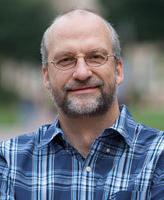In 2009 the University of Notre Dame launched the Science of Generosity, an initiative funded by a $5 million grant from the John Templeton Foundation, to support and conduct research into the origins, manifestations, and consequences of generosity.

Directed by Christian Smith, the William R. Kenan, Jr. Professor of Sociology, the initiative has awarded nearly $3 million to 13 research projects conducted by scholars around the world, and it is in the second year of conducting its own research on the causal mechanisms that encourage and inhibit generosity.
“Research projects like the Science of Generosity initiative that investigate broad moral questions, social and personal virtues, and the common good are integral to Notre Dame’s academic mission,” Smith says.
“Catholic social teachings emphasize people’s responsibility to contribute to the common good of humanity and society, and in particular to share goods with others generously and justly. Our research initiative brings scholars from across the world and from many disciplines—Catholic, non-Catholic, and non-religious—into conversation on a topic of fundamental importance, we think, to human flourishing. So, while better understanding generosity is a matter of interest to very many kinds of people, it may well be a project particularly at home in a Catholic research university.”

The funded projects come from around the world and from a variety of disciplines including sociology, psychology, political science, and economics. The studies will continue until the fall of 2012 when researchers will present their final results at a conference in New York City. Several projects have preliminary results, with notable findings including:
- A genetic idiosyncrasy in young children that is associated with a low proclivity toward generosity;
- Members of social networks are influenced by fellow group members’ contribution behavior in future interactions with others who were not involved in the initial interaction;
- Charities have long known that asking for contributions dramatically increases the generosity in donors, and it now appears that the “power of asking” comes from its heightening empathy between donors and recipients;
- “Crowding out,” or decreased donations as a result of government grants is an issue dealt with by many charities. But government grants to charities don’t decrease donations because donors consider themselves to have given indirectly as taxpayers; instead, they decrease because of the reduced fundraising that follows government grants.
Additional information about the Science of Generosity and current research projects can be found here.
Learn More >
- Science of Generosity
- Christian Smith faculty page
- Department of Sociology
- Related story: Christian Smith’s latest book
Originally published at newsinfo.nd.edu.


